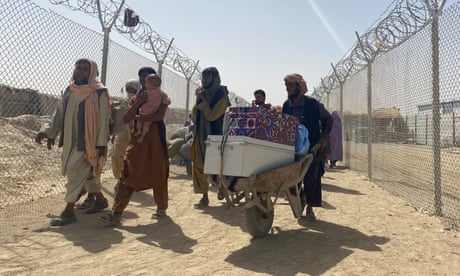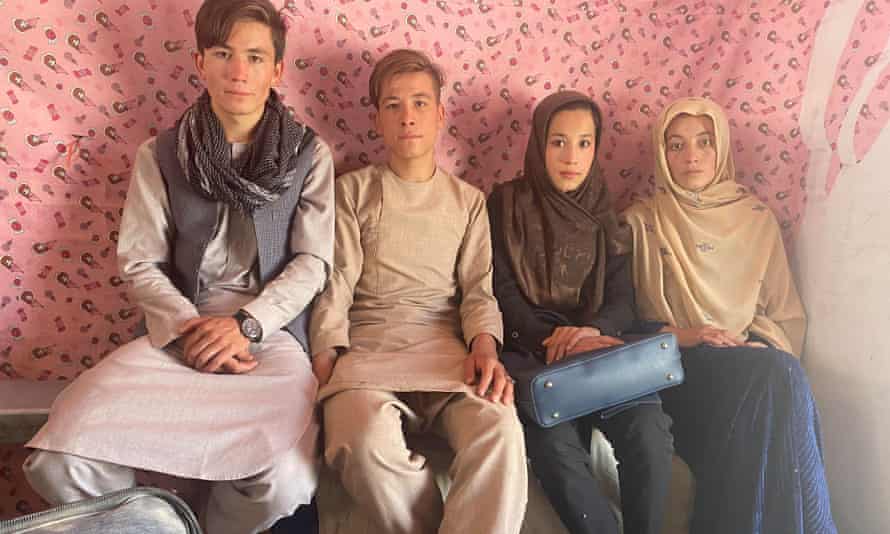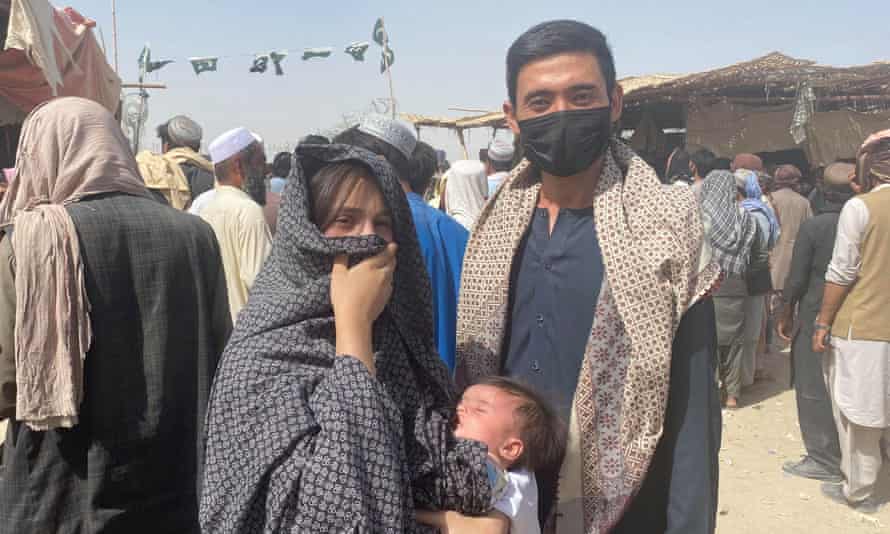Attacks on religious minority prompt exodus of thousands across border to Pakistan to seek safety
Sher Ali with his wife and small baby who fled Kabul and reached Chaman, Pakistan on Thursday. Photograph: Shah Meer Baloch
Shah Meer Baloch in Chaman
Sun 29 Aug 2021
As word of Kabul’s fall to the Taliban spread across Afghanistan, there were few who greeted the news with as much fear as the Hazara Shias. The religious minority in this Sunni majority country were among the most persecuted groups when the Taliban last ruled Afghanistan, and the memories of the killings, torture and mass executions have not faded.
Signs point to Hazaras once again finding themselves a target of the Taliban. A recent Amnesty report found that Taliban militants were responsible for the murder of nine Hazaras in July, in the village of Mundarakht. Six of the men were shot and three were tortured to death, including one man who was strangled with his own scarf and had his arm muscles sliced off.
Attacks such as these have prompted a mass exodus of Hazara people over the border to Pakistan, and activists say that about 10,000 have arrived in the Pakistan city of Quetta, in Balochistan, where they are living in mosques and wedding halls, and renting rooms. Several Hazaras told the Guardian they had paid traffickers from £50 to £350 to get them across the border.
Among those sheltering in Quetta was Sher Ali, 24, a shopkeeper, who had escaped with his wife and baby. Ali reached Chaman on the Pakistan side of the frontier on Thursday. The journey, through territory controlled by the Taliban, had taken three days. They had driven along roads decimated by bomb blasts, passing burnt-out cars and destroyed bridges.
Ali had decided to leave after he witnessed his friend Mohammad Hussain, 23, being shot dead by the Taliban 10 days ago in Kabul. Hussain had been passing through a Taliban security checkpoint on a motorbike. He refused to stop and they fired at him with an assault rifle.
“When I went to the spot, Hussain’s dead body was lying on the road in a pool of blood. They emptied the AK-47 on him,” said Ali. “It was the moment I decided to leave. It is like a do or die situation for Hazara Shia; whether to leave and live, or stay and die.”
In recent days, there have been chaotic scenes at the Chaman border crossing, as tens of thousands of Afghans have attempted to make it across. Only those with Pakistan residency papers or people travelling to Pakistan for medical treatment are officially allowed in, but some of the Hazaras said traffickers would bribe authorities at the border to get Afghans across illegally.

‘Everyone is afraid’: Afghans fleeing Taliban push for exit into Pakistan
Ali said his remaining family members would be leaving for Pakistan within a few days. “We can’t live in the Taliban’s Afghanistan,” he said.
Mohammed Sharif Tahmasi, 21, a computer science student from Ghazni province, reached Chaman along with his two sisters and brother on Thursday. After making the border crossing, they waited in a muddy corner near the border fence for some more Hazara families so they could travel to Quetta together.
Tahmasi’s family has never been to Pakistan but his parents had given the children some money and instructed them to urgently get over the border as soon as they could.

Shah Meer Baloch in Chaman
Sun 29 Aug 2021
As word of Kabul’s fall to the Taliban spread across Afghanistan, there were few who greeted the news with as much fear as the Hazara Shias. The religious minority in this Sunni majority country were among the most persecuted groups when the Taliban last ruled Afghanistan, and the memories of the killings, torture and mass executions have not faded.
Signs point to Hazaras once again finding themselves a target of the Taliban. A recent Amnesty report found that Taliban militants were responsible for the murder of nine Hazaras in July, in the village of Mundarakht. Six of the men were shot and three were tortured to death, including one man who was strangled with his own scarf and had his arm muscles sliced off.
Attacks such as these have prompted a mass exodus of Hazara people over the border to Pakistan, and activists say that about 10,000 have arrived in the Pakistan city of Quetta, in Balochistan, where they are living in mosques and wedding halls, and renting rooms. Several Hazaras told the Guardian they had paid traffickers from £50 to £350 to get them across the border.
Among those sheltering in Quetta was Sher Ali, 24, a shopkeeper, who had escaped with his wife and baby. Ali reached Chaman on the Pakistan side of the frontier on Thursday. The journey, through territory controlled by the Taliban, had taken three days. They had driven along roads decimated by bomb blasts, passing burnt-out cars and destroyed bridges.
Ali had decided to leave after he witnessed his friend Mohammad Hussain, 23, being shot dead by the Taliban 10 days ago in Kabul. Hussain had been passing through a Taliban security checkpoint on a motorbike. He refused to stop and they fired at him with an assault rifle.
“When I went to the spot, Hussain’s dead body was lying on the road in a pool of blood. They emptied the AK-47 on him,” said Ali. “It was the moment I decided to leave. It is like a do or die situation for Hazara Shia; whether to leave and live, or stay and die.”
In recent days, there have been chaotic scenes at the Chaman border crossing, as tens of thousands of Afghans have attempted to make it across. Only those with Pakistan residency papers or people travelling to Pakistan for medical treatment are officially allowed in, but some of the Hazaras said traffickers would bribe authorities at the border to get Afghans across illegally.

‘Everyone is afraid’: Afghans fleeing Taliban push for exit into Pakistan
Ali said his remaining family members would be leaving for Pakistan within a few days. “We can’t live in the Taliban’s Afghanistan,” he said.
Mohammed Sharif Tahmasi, 21, a computer science student from Ghazni province, reached Chaman along with his two sisters and brother on Thursday. After making the border crossing, they waited in a muddy corner near the border fence for some more Hazara families so they could travel to Quetta together.
Tahmasi’s family has never been to Pakistan but his parents had given the children some money and instructed them to urgently get over the border as soon as they could.

left to right Mohammad Sharif Tahmasi, Ashmatullah Tahmasi, Nahid Tahmasi and Umaira Tahmasi who fled Kabul. Photograph: Shah Meer Baloch
“All Hazara parents are asking their children to leave Afghanistan and be safe,” said Tahmasi. “I don’t know how my parents and the other siblings are, but I hope my siblings are fine and they will cross soon.”
Sharif’s sister Nahid Tahmasi, 15, a student in an elementary school, said she did not want to abandon her parents but, before she had left Ghazni, Taliban restrictions on women had already begun to be enforced.
“I feel terrible,” she said. “I can’t go to school and I miss my city and friends. I miss my parents. I miss my school. When the Taliban took control of Ghazni province they banned girls’ entry into public parks and schools. They did not want girls to study. We could not roam outside, visit our neighbours and dress the way we want.”
Gulalai Haideri, a Hazara who worked as a teacher at the Women for Afghan Women NGO, in Faryab province, reached Quetta five days ago. She is pregnant and sold her jewellery to pay for the journey and to be smuggled across the border.
“We were rejected twice for entry but then I begged the guards to allow me to enter as I am pregnant and I can’t live in Afghanistan. I am a woman, I will be killed,” she said. “They had mercy and allowed my family to enter.”
Haideri said that after her province fell to the insurgents, the Taliban had been going door to door to find unmarried girls, orphaned girls, divorced women and widows to get married to their fighters.
Mohammad Fahim Arvin, 21, a student at the Kabul Polytechnic University, was told by his parents to leave and save his life. But he spoke of his sadness at having to leave his parents behind.
“The Taliban hate us and want us to join them and fight for them, but we can’t,” said Arvin. “It is not my fault I was born as a Hazara; it was God’s decision. It was not in my hands. Why do they [Taliban] want to kill us for being Hazara?”
Yet even in Pakistan, the Hazaras are not in safe territory. Here too they have been persecuted for three decades by the Sunni militant groups. Earlier this year, 10 Hazara miners working in Balochistan were murdered by members of Islamic State. According to a 2019 report by Pakistan’s National Commission for Human Rights, at least 509 Hazara have been murdered for their faith since 2013.
For many of Afghanistan’s Hazara community arriving into Pakistan with little money and no connections, they have had to rely on the kindness of the local community.
Syed Nadir was among those hosting five Hazara families, including Haideri’s family in Quetta who had arrived in recent days.
“I don’t know any of them, but all Hazara are going through one of the worst times,” he said. “They are leaving their homes and we should host them. All countries should play their part for the Hazaras and the Afghans.”
“All Hazara parents are asking their children to leave Afghanistan and be safe,” said Tahmasi. “I don’t know how my parents and the other siblings are, but I hope my siblings are fine and they will cross soon.”
Sharif’s sister Nahid Tahmasi, 15, a student in an elementary school, said she did not want to abandon her parents but, before she had left Ghazni, Taliban restrictions on women had already begun to be enforced.
“I feel terrible,” she said. “I can’t go to school and I miss my city and friends. I miss my parents. I miss my school. When the Taliban took control of Ghazni province they banned girls’ entry into public parks and schools. They did not want girls to study. We could not roam outside, visit our neighbours and dress the way we want.”
Gulalai Haideri, a Hazara who worked as a teacher at the Women for Afghan Women NGO, in Faryab province, reached Quetta five days ago. She is pregnant and sold her jewellery to pay for the journey and to be smuggled across the border.
“We were rejected twice for entry but then I begged the guards to allow me to enter as I am pregnant and I can’t live in Afghanistan. I am a woman, I will be killed,” she said. “They had mercy and allowed my family to enter.”
Haideri said that after her province fell to the insurgents, the Taliban had been going door to door to find unmarried girls, orphaned girls, divorced women and widows to get married to their fighters.
Mohammad Fahim Arvin, 21, a student at the Kabul Polytechnic University, was told by his parents to leave and save his life. But he spoke of his sadness at having to leave his parents behind.
“The Taliban hate us and want us to join them and fight for them, but we can’t,” said Arvin. “It is not my fault I was born as a Hazara; it was God’s decision. It was not in my hands. Why do they [Taliban] want to kill us for being Hazara?”
Yet even in Pakistan, the Hazaras are not in safe territory. Here too they have been persecuted for three decades by the Sunni militant groups. Earlier this year, 10 Hazara miners working in Balochistan were murdered by members of Islamic State. According to a 2019 report by Pakistan’s National Commission for Human Rights, at least 509 Hazara have been murdered for their faith since 2013.
For many of Afghanistan’s Hazara community arriving into Pakistan with little money and no connections, they have had to rely on the kindness of the local community.
Syed Nadir was among those hosting five Hazara families, including Haideri’s family in Quetta who had arrived in recent days.
“I don’t know any of them, but all Hazara are going through one of the worst times,” he said. “They are leaving their homes and we should host them. All countries should play their part for the Hazaras and the Afghans.”

No comments:
Post a Comment